Bara
 Tuesday, February 10, 2015 at 08:04AM
Tuesday, February 10, 2015 at 08:04AM 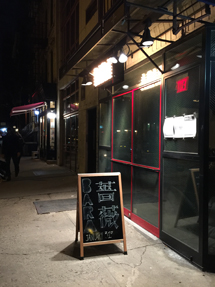

 David Chang’s Momofuku empire now spans a dozen restaurants in three countries. But how many restaurants outside of that empire are run by chefs boasting “Momofuku vet” on their bios? I’ve lost count.
David Chang’s Momofuku empire now spans a dozen restaurants in three countries. But how many restaurants outside of that empire are run by chefs boasting “Momofuku vet” on their bios? I’ve lost count.
One thing’s for sure: it’s a brand that chefs want on their resume these days, and it’s the calling card at Bara, which opened in the East Village in December, boasting two Momofuku alumni. Chef Ian Alvarez worked at Noodle Bar, and later at French Louie in Boerum Hill, Brooklyn. GM Kyle Storm worked at Má Pêche, and later ran the bar at French Louie.
The website notes coyly that “the word bara has many meanings,” without stating any of them. Apparently, it literally means “rose” in Japanese, but it is also short for Barazoku, a Japanese gay men’s magazine that shut down in 2004; or more generally, Japanese slang for a genre of homoerotic media. There are a few other meanings: bara means “bread” in Welsh, “coffin” in Italian, “puddle” in Serbo-Croatian, and “mainland” in Swahili. But if you Google the term, the gay context dominates the search results, so this must be the the one that was meant, for reasons that aren’t at all clear. I was unaware of this until I looked it up.
The restaurant claims to be a mash-up of the Japanese izakaya (a drinking establishment that serves food) and the Parisian wine bar. Frankly, it doesn’t remind me of either. It’s just a casual local restaurant that fuses the two cultures, starting with the place setting: silverware and chopsticks, a combo we’ve seen before. Very little of the food really requires chopsticks, so their presence is mainly to set a mood.
The compact (and inexpensive) menu, which changes daily, features about a half-dozen apiece of “1st” ($6–12) and “2nd” ($18–22) courses, with four sides ($2–9). Many of the dishes could easily be imagined at a Momofuku restaurant, with their eclectic mix of local and Asian ingredients, and predominantly Western cooking techniques.
We dined at the chef’s invitation and did not pay for our meal. However, we ordered from the menu as we normally would. Except for the amuse bouche and one extra course sent out from the kitchen, the selections were ours.

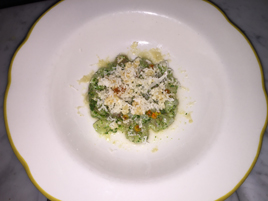
We began with a plate of pickled vegetables (above left), which I believe is served at every table. Mackerel tataki ($11; above right) is a Japanese preparation in which the fish is pounded into pieces and mixed with vegetables and spices, here horseradish and ponzu.
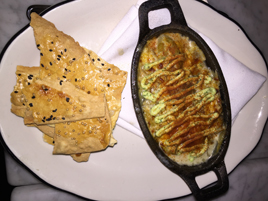
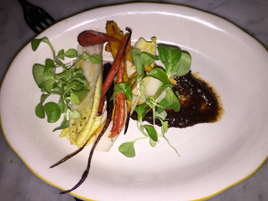
Artichoke gratin ($11; above left) is Bara’s take on chips and queso, made here with smoked paprika and served with lavash, a crisp Armenian flatbread. The kitchen sent out an order of the baby carrots and endive ($11; above right), served in a peppercorn sauce and umeboshi, a kind of pickled fruit.
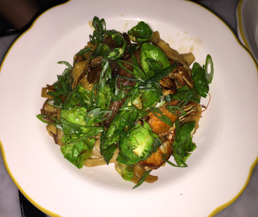

For the mains, we had the buckwheat noodles with oxtail and prawn ($18; above left) and perhaps the most conventionally straightforward dish of the evening, the duck breast in tea and sunflower ($22; above right).
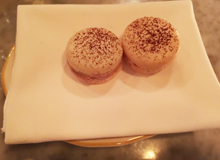 I think there were only two desserts on offer: we enjoyed the macaroons (left).
I think there were only two desserts on offer: we enjoyed the macaroons (left).
To drink, there’s a selection of cocktails, beer, sakes, and wines by the glass—none above $14, and many less than that. The bottle list (22 choices) is similar, with nothing over $76. Among the wines, there is a slight tilt toward France, with a smattering of other regions. All of them are organic, sustainable, or biodynamic, and this seems to be the emphasis, rather than any geographic orientation.
The dining room is fairly small and bare-bones, with bare marble tables and brick walls painted white. There’s a 4-seat bar at the back, and behind it a partially-open kitchen. Flower arrangements in wall nooks supply a bit of color in the otherwise unchromatic space.
There’s every reason to think the right restaurant could flourish here. Just a couple of doors down, Gabrielle Hamilton has been packing them in at Prune for over fifteen years. Joe and Misses Doe and its predecessor, JoeDoe, have been in business across the street since 2008. The last tenant here, an all-day restaurant called Prima, lasted just three years, but its predecessor, a Thai restaurant–lounge called The Elephant, lasted seventeen years.
The chef’s food is all enjoyable and prepared with skill. I do think the Parisian/Izakaya fusion concept is more confusing than helpful. The restaurant might be easier to decode if the chef just does his thing, which is the only selling point it needs.
Bara (58 E. First Street between First & Second Avenues, East Village)



Reader Comments